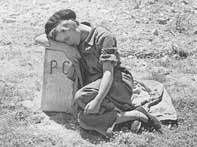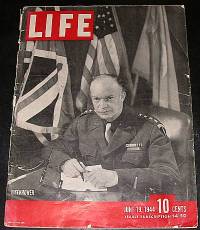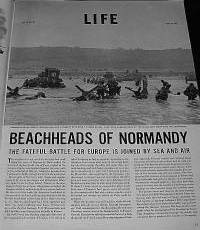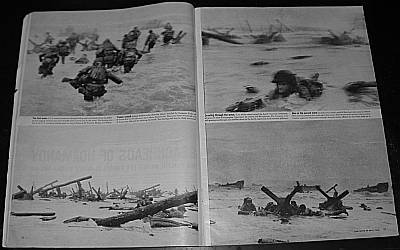Waltzing Matilda
6 Juin 2004
Sixty years ago to the minute, the Allied troops landed in Normandy to help free Europe from the Nazi barbary. USA was a huge part of this effort, along with Great Britain, Canada, and many other countries. Thousands of young men died on these beaches, very far away from their home. As a french, I have something to say:
Thank you America.
If you just want simple messages, you can stop here.
Don't believe what you may hear in Fox News. French people did not forget about the US help during World War I and II. On the opposite, I think the D-Day became a symbol of the beginning of a new era for Europe. And everybody knows that. Just go and visit Normandy if you are not convinced. I don't like quick and simple jokes by right-wing conservatives, along the lines of "If we didn't help them, they would speak german now". I could reply something like "If Lafayette didn't help you, you would have a Queen profile on your dollars now". But I'm not sure they know who Lafayette was.
We europeans love to criticize our leaders. Any leader. Every other day, I trash US actual politics, but I criticize much more french leaders and even the not so beautiful history of my country. It's a cultural difference, I think. Something about skepticism. Not following the crowd without at least trashing it a little bit.
To be thankful for what USA did sixty years ago does not mean we have to praise everything this country is doing. Especially right now. I think the current White House administration is the biggest threat to the world peace and stability of this (young) century. Gung-ho leaders who send young people to die, while themselves did everything they could to dodge the draft when their own life was on the line. And not to defend a beautiful ideal of freedom, but to protect their economic investments. This is extremely dangerous on the short and long range. It's playing with fire. You don't win the heart of populations by killing civilians. Anybody read about the Marshall Plan in the White House? That was another brilliant idea from America, and it certainly helped my country a lot in the difficult post-war times.
The second World War was probably the very last "just" war, if that does not sound too much like an oxymoron. War is the worst thing that can happen to human beings, there is no need to transform them into romantic Hollywood images (as director Samuel Fuller - who was himself a soldier at Omaha beach on D-Day - said: "Never allow a dying GI to bring out his wallet to look at his fiancee's photograph. That never happens."). War is plain slaughter, even the modern ones for which you see a few carefully chosen images on CNN, it's blood and pieces of brain, it's limbs blown up, it's exploding skulls, it's screams and cries, it's intestines flowing out of someone still alive. Still, the Second World War had to be fought, I think. All the wars after this one, mainly from the decolonisation chaos and the Cold War indirect fights, from Indochina, Vietnam, Algeria, to Chechenya and Iraq, all of them, were not just.
Anyway. Today was the obvious day to read again the book by Stephen Ambrose called "D-Day". It's made from oral recollection of veteran memories from many corps, and at all level, from Eisenhower to Privates. The D-Day not as a vast choregraphied and Hollywood heroic saga, but the personal and very down-to-earth accounts of people who were there. Normal fellows in an exceptional time and place. Death, slaughter, exhaustion, small weaknesses and small acts of bravery, even very funny anecdotes, all seen from the ground level. From the highly succesful operations done almost flawlessly in a few minutes, like the famous Pegasus Bridge seizing at night behind enemy lines, to total failures like the first hours at Omaha Beach. It's mainly focused on US troops, and of course you have some missing points of view. Who remembers the hundreds of GI's who died while training during a D-Day rehearsal at Slapton Sand beaches? Who remembers the poor norwegian sailors of the Svenner who died when the only battleship of the allied armada was blown up by a german torpedo on June 6th? Which reminds me that very up north in Norway, around Narvik, you can still see traces of combats. Like old ship wrecks rotting in some peaceful fjord. These silent old traces of forgotten battles are particularly moving. But I digress again. The Ambrose book is a fascinating read. Normal people like you and me in an exceptional situation. These accounts are the words equivalent of the famous Capa pictures.
Capa was an incredible person. A real legend of the twentieth century. He photographed a few important wars, from the Spanish Civil War, where his girlfriend Gerda Taro, twenty-five years old and herself an excellent photographer was killed by a Republican tank during the chaos of Brunete, to the Indochina war, where he stepped on a anti-personal mine while following french troops, and died, his camera still in his hand.

Gerda Taro sleeping, exhausted, somewhere
in Spain, photographed by Capa
He even had an affair with Ingrid Bergman after the war. A tasteful guy for sure. Capa once famously said "If your photos aren't good enough, you are not close enough". On D-Day, he once again followed his own advice: he was on the first waves to hit Omaha Beach. The eye of the storm on this day. He didn't have any weapon, only three cameras. I won't mention the very famous story of how the rolls of these precious films got almost ruined in London, and how the editor covered it up by saying:

"Immense excitement of moment made
Photographer Capa move his camera and blur picture"
The very few pictures that were not destroyed were published in the US in Life Magazine dated June 19, 1944. I have a vintage issue of this magazine. It's very interesting to read this kind of publication. A trip sixty years back. Very kitsh advertizing and articles. The atmosphere of war almost everywhere: D-Day and the liberation of Rome, an excellent and almost progressist and very open and frank article about the social misery induced by the war in Italy, as witnessed (and sometimes caused by) american GI's. At the same time, an obviously global sexist (women are all mothers or secretaries) and somehow racist tone (the segregation was still existing, including in the US Army). To read this issue of Life is like a time machine. Here are a few pictures:



Life magazine, June 19th 1944
The intensity of Capa pictures obviously influenced very much the way Spielberg shot the first landing sequence in his movie "Saving Private Ryan". It's all filmed from shoulder, not focused, trembling images, deafening noises. The opposite of "The Longest Day". I think this sequence is probably very realistic. Bloody Omaha Hell was certainly like that. With one exception, of course. The actors are all way too old for the roles. Most of the men who were on the beaches this day were around eighteen, and when they were talking about "old men", it was twenty-two, twenty-three years old officers. Tom Hanks, although a good actor, is probably twice this age.
Talking about great picture makers, there was another great director near the beaches this day. No less than John Ford, working for the US Army propaganda. He sent a handful of young guys from the Coast Guards, with color movie cameras, to Omaha. Although I've read some interview where he talked about it, I've never seen the actual result. I don't really know what happened to this film, and if it still exists, which is a pity. I would love to see actual footage of the battle in Omaha Beach in Kodachrome, directed and cut by John Ford.
The funny thing is that ten years ago, during the 50-years anniversary of the D-Day, I was in the french army, doing my military service. I remember looking at the ceremonies, with all of those veterans in uniform, on the small TV we had in the control tower of this airport. And I was myself in uniform, while at the same time giving flight plans to training helicopter combat pilots, because that was my job, more or less. Now don't get me wrong, I never liked military life and I think the armies are powerful brainwashing machines for individuals, and I had the unlucky occasion during one year to study these psychological mechanisms from close. It was just a funny coincidence.
The D-Day is well remembered by everybody in our countries. But somehow, it reminds me another bloody battle, another landing, another slaughter, that nobody remembers, except probably in Australia and New Zealand. That was 89 years ago. It was a vast failure because of the incompetence and arrogance of the leaders, including Winston Churchill, and again, thousands of young people died, this time for nothing at all. It's the ANZAC (Australian and New Zealand Army Corps) troops landing in the Gallipoli bay in Turkey during the first World War. In honor of these long forgotten fellows, Eric Bogle wrote a song called "Waltzing Matilda", about a soldier who lost his legs in the battle. These commemorations always remind me the last paragraph of this song. The two best versions I know are sung by The Pogues and by The Dubliners. Probably one of the better anti-war song. Here are the lyrics:
When I was a young man I carried my pack
And I lived the free life of a rover
From the Murrays green basin to the dusty outback
I waltzed my Matilda all over
Then in nineteen fifteen my country said Son
It's time to stop rambling 'cause there's work to be done
So they gave me a tin hat and they gave me a gun
And they sent me away to the war
And the band played Waltzing Matilda
As we sailed away from the quay
And amidst all the tears and the shouts and the cheers
We sailed off to Gallipoli
How well I remember that terrible day
How the blood stained the sand and the water
And how in that hell that they called Suvla Bay
We were butchered like lambs at the slaughter
Johnny Turk he was ready, he primed himself well
He chased us with bullets, he rained us with shells
And in five minutes flat he'd blown us all to hell
Nearly blew us right back to Australia
But the band played Waltzing Matilda
As we stopped to bury our slain
We buried ours and the Turks buried theirs
Then we started all over again
Now those that were left, well we tried to survive
In a mad world of blood, death and fire
And for ten weary weeks I kept myself alive
But around me the corpses piled higher
Then a big Turkish shell knocked me arse over tit
And when I woke up in my hospital bed
And saw what it had done, I wished I was dead
Never knew there were worse things than dying
For no more I'll go waltzing Matilda
All around the green bush far and near
For to hump tent and pegs, a man needs two legs
No more waltzing Matilda for me
So they collected the cripples, the wounded, the maimed
And they shipped us back home to Australia
The armless, the legless, the blind, the insane
Those proud wounded heroes of Suvla
And as our ship pulled into Circular Quay
I looked at the place where my legs used to be
And thank Christ there was nobody waiting for me
To grieve and to mourn and to pity
And the band played Waltzing Matilda
As they carried us down the gangway
But nobody cheered, they just stood and stared
Then turned all their faces away
And now every April I sit on my porch
And I watch the parade pass before me
And I watch my old comrades, how proudly they march
Reliving old dreams of past glory
And the old men march slowly, all bent, stiff and sore
The forgotten heroes from a forgotten war
And the young people ask, "What are they marching for ?"
And I ask myself the same question
And the band plays Waltzing Matilda
And the old men answer to the call
But year after year their numbers get fewer
Some day no one will march there at all
Waltzing Matilda, Waltzing Matilda
Who'll come a waltzing Matilda with me
And their ghosts may be heard as you pass the Billabong
Who'll come-a-waltzing Matilda with me?
[guillermito a gmail com] - [Home]